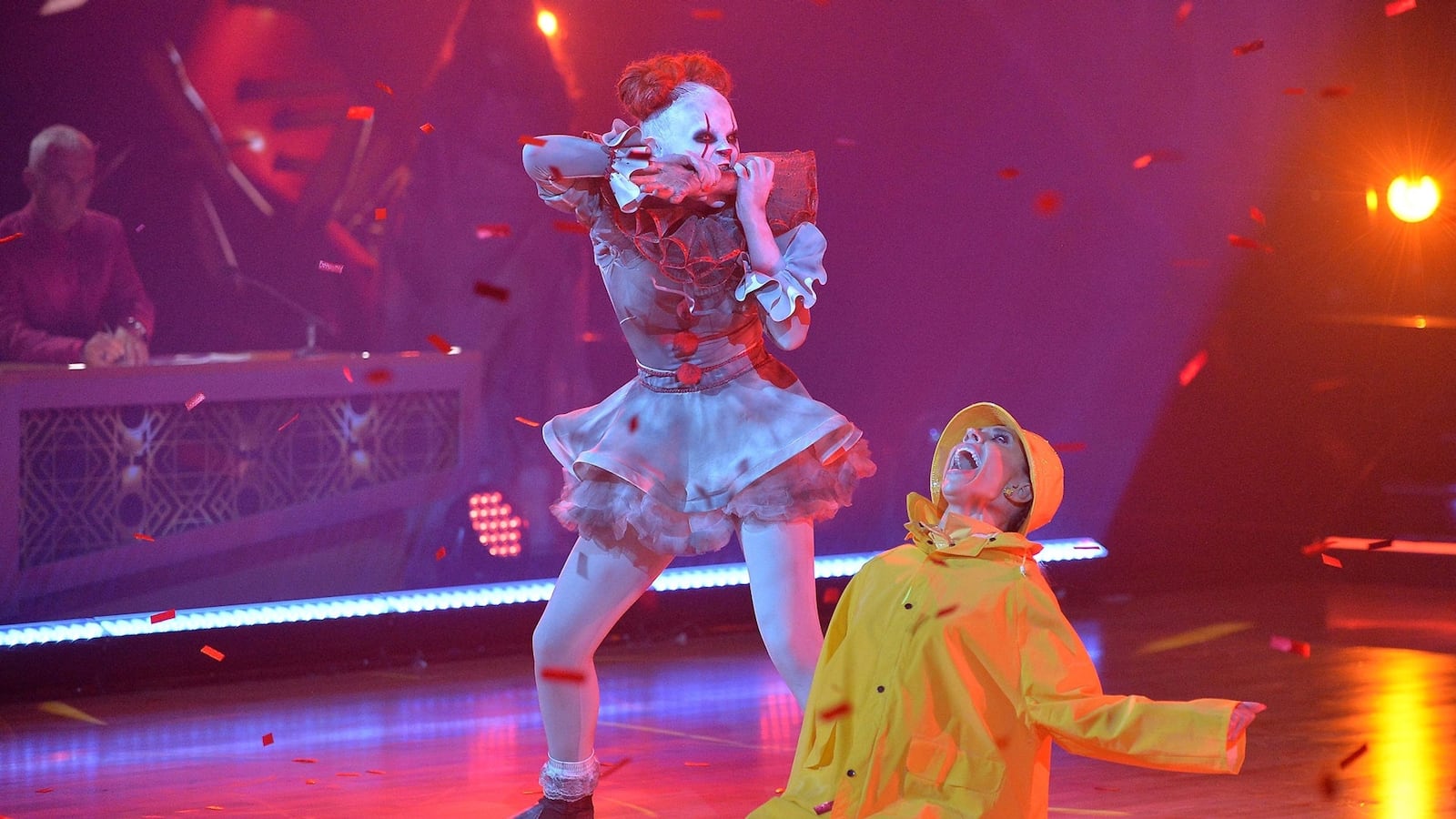I regret to inform you that my nemesis is at again.
This week, the television program Dancing With the Stars—the deplorable bane of my existence; the circus of glorious chaos I just can’t quit—pierced the zeitgeist, and possibly also my heart, with a slew of rousing, expectation-thwarting, at once baffling and brilliant performances that quickly went viral.
I feel unmoored from my sense of reality. The things that ground me—what I knew about myself and what I enjoyed—have been knocked entirely off their axes. The question that has haunted me off and on for the last 16 years, as existential a question that I dare ask myself, has returned: Do I, against my better judgment and everything I believe in, actually like Dancing With the Stars?
You may have seen the clip spreading around social media this week.
JoJo Siwa, dressed as Pennywise the killer clown from It, performed a jazz routine to a spooky remix of the Broadway standard “Anything Goes” and got a perfect score on Dancing With the Stars.
It is a collection of words that should raise flags of utter nonsense, like a bot had malfunctioned and started to spit out phrases that have no place being next to each other in the English language. It’s like someone at ABC played a game of Mad Libs with their grandchild, and then on a lark made it come to life on a popular reality-TV series. It is absurd. It is alarming. It is art.
I’m not even sure how much backstory to give about what is going on here, what it means, and why it is arguably remarkable.
Surely by now, you know what Dancing With the Stars is, a long-in-the-tooth competition show in which celebrities on a sliding scale of “oh, that’s what they’re up to!” to “literally who???” learn ballroom dance routines and compete for a mirrorball trophy.
JoJo Siwa is an 18-year-old, very online powerhouse who turned a stint on the reality show Dance Moms into extreme YouTube popularity and eventually a juggernaut empire of rainbow and beglittered ostentatiousness and excessive enthusiasm. The youths are obsessed, and, while many of us may not have been aware of her or her reach, she is shrewd casting for a series hoping to spike its level of awareness in the youth and social market.
This year, Siwa came out as pansexual and is now the first celebrity in Dancing With the Stars history to compete with a same-sex partner, a progressive milestone for a series with a strong conservative base, but also such a long time coming that it is almost unbelievable that it hasn’t happened yet.
Then there’s the dance itself, an exceptionally choreographed combination of menacing and unsettling contortions with elegantly executed gymnastics, pirouettes, and technique. Siwa goes in on the character work, managing to be a believable homicidal clown while skipping around a ballroom dance floor right up until the gruesome ending that had me squealing the first time I watched.
But here’s the thing: This wasn’t an anomaly. The whole night featured similarly stunning routines, all of which are based on horror films—not exactly what you’d imagine to be the strongest vehicle for Dancing With the Stars asserting its relevance again.
NBA player Iman Shumpert and his partner did a modern dance as the Tethereds from Us, and it was similarly disturbing and artistic. They also got a perfect score. Peloton instructor Cody Rigsby—peak 2021: a Peloton instructor is on Dancing With the Stars—performed a cha-cha-cha inspired by the Patrick Bateman serial killer character in American Psycho (more words that I can’t believe I’m typing in this order) and it kind of slapped. Melora Hardin, of The Office and Transparent fame, did a jive to the song “Hound Dog” inspired by Stephen King’s Cujo. It was lunacy. I loved it.
So here we are wondering, yet again, is Dancing With the Stars actually good? It’s hard to stomach when this is a show that we hadn’t just dismissed as tired camp long ago, but actively abhorred and felt was damaging to culture.
The show has a notorious history of troll casting—hiring disgraced and controversial public figures with the winking, mischievous idea that watching them struggle to do the Argentine tango amounts to good TV. It’s also doubled, however, as a platform for redemption, opportunity to manipulate the public to their favor with self-serving clip packages and monologues, and dresses shamelessness up in bedazzled costumes.
Bristol Palin, Rick Perry, Sean Spicer, and Tucker Carlson have all performed. Last season’s casting of Tiger King’s Carole Baskin marked a new low. Glorifying a breakout character from a docuseries that traded in animal abuse and made her a star because of rumors that she had murdered her husband is one thing. Painting her as the “crazy cat lady,” as if this was going to be some wholesome viewing experience, is another. Producers knew the public’s unsavory hatred for her. This was bloodsport. She was being thrown to the tigers.
Sometimes that agenda is obvious. Other times, I’m not really sure what the producers think they’re accomplishing with this kind of stunt casting.
This season, Olivia Jade, whose parents Lori Loughlin and Mossimo Giannulli were implicated in the Operation Varsity Blues college admissions scandal, is a competitor. In the first episode, she doesn’t introduce herself as a person of current public interest because she was the poster child for wealthy entitlement, privilege, and delusion amidst a wild controversy. She argues that you probably know her as an influencer. Her dancing has been great this season. And yet… why?
Dancing With the Stars is a series that I’ve, at times, watched religiously, sworn off completely, or dabbled in in spite of myself.
There can be an earnestness that I find irresistible. That earnestness, of course, is in service of a kind of glorious, captivating schmaltz that warrants hours of investment each week for more than a decade: things like Dirty Dancing actress Jennifer Grey’s Hollywood redemption arc, Valerie Harper’s brave cancer battle, the thrill of an athlete like Emmitt Smith tackling gender norms and learning ballroom dance on national television, or the simple joy of that adorable Adam Rippon still being on our screens even after the Olympics are over.
Episodes like the one that aired this week proved the potential of a series at a time in its run when it has no right to continue to produce content that was that good. But how do you reconcile that with the show’s more grotesque history? Well, I guess that’s the thing about a Halloween-timed, horror-themed episode: Grotesque is the point.






